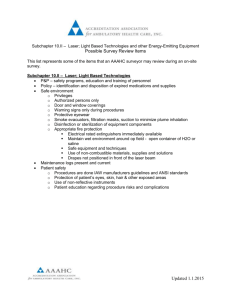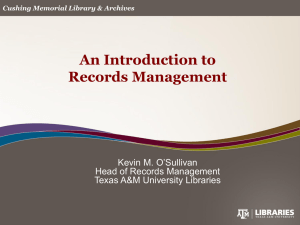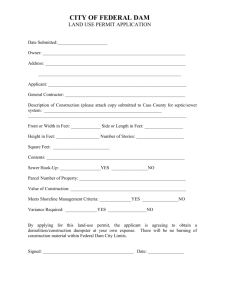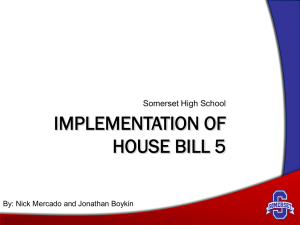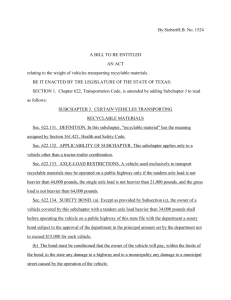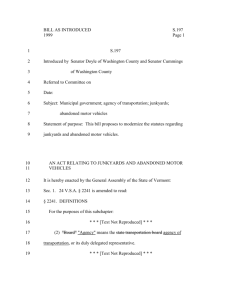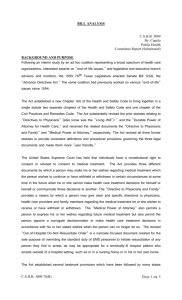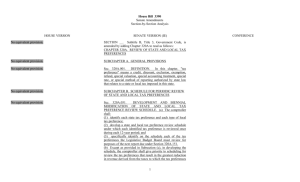By: Armbrister S.B. No. 1198 A BILL TO BE ENTITLED AN ACT
advertisement
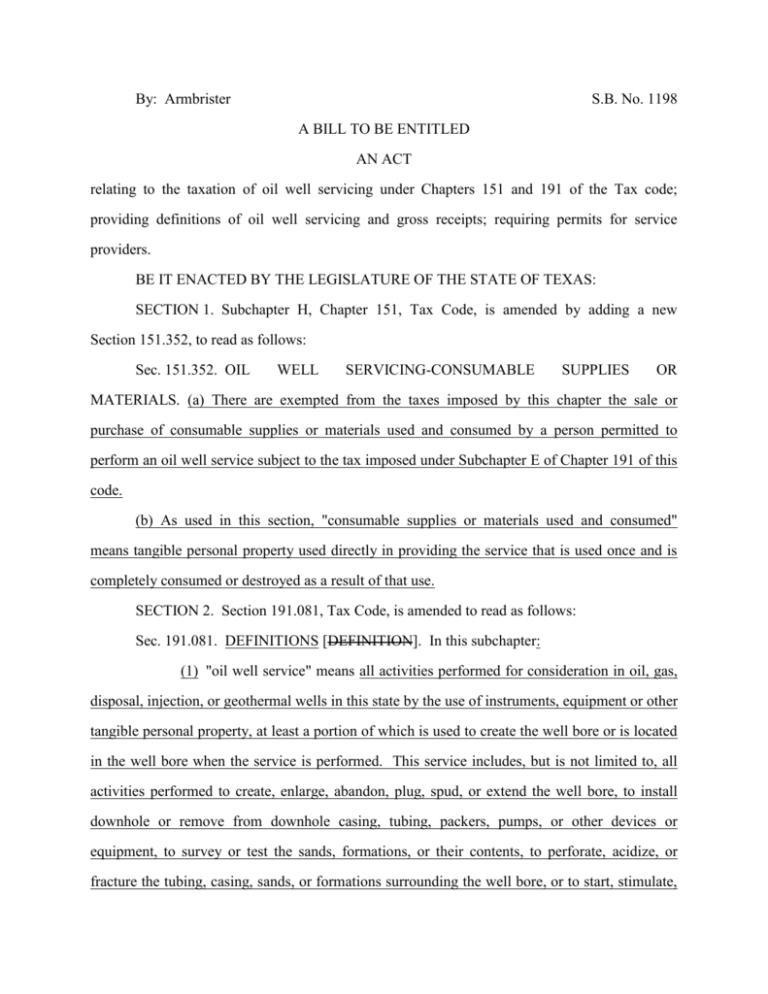
By: Armbrister S.B. No. 1198 A BILL TO BE ENTITLED AN ACT relating to the taxation of oil well servicing under Chapters 151 and 191 of the Tax code; providing definitions of oil well servicing and gross receipts; requiring permits for service providers. BE IT ENACTED BY THE LEGISLATURE OF THE STATE OF TEXAS: SECTION 1. Subchapter H, Chapter 151, Tax Code, is amended by adding a new Section 151.352, to read as follows: Sec. 151.352. OIL WELL SERVICING-CONSUMABLE SUPPLIES OR MATERIALS. (a) There are exempted from the taxes imposed by this chapter the sale or purchase of consumable supplies or materials used and consumed by a person permitted to perform an oil well service subject to the tax imposed under Subchapter E of Chapter 191 of this code. (b) As used in this section, "consumable supplies or materials used and consumed" means tangible personal property used directly in providing the service that is used once and is completely consumed or destroyed as a result of that use. SECTION 2. Section 191.081, Tax Code, is amended to read as follows: Sec. 191.081. DEFINITIONS [DEFINITION]. In this subchapter: (1) "oil well service" means all activities performed for consideration in oil, gas, disposal, injection, or geothermal wells in this state by the use of instruments, equipment or other tangible personal property, at least a portion of which is used to create the well bore or is located in the well bore when the service is performed. This service includes, but is not limited to, all activities performed to create, enlarge, abandon, plug, spud, or extend the well bore, to install downhole or remove from downhole casing, tubing, packers, pumps, or other devices or equipment, to survey or test the sands, formations, or their contents, to perforate, acidize, or fracture the tubing, casing, sands, or formations surrounding the well bore, or to start, stimulate, restore, maintain, increase, or stop production. The term does not include activities performed before spudding, and activities on or near the surface of the earth in preparation for or support of drilling a well, such as constructing, repairing, or maintaining roads and pads, digging pits, or setting up drilling equipment; and does not include activities performed after plugging and abandoning of a well; or services performed on a well the purpose of which is to produce water; (2) "gross receipts" means the total value charged or received by, or promised as consideration to, the person who performs a well service without a deduction for the materials or equipment used, labor or service employed, interest, losses, or other expenses incurred by the service provider; or, transportation incidental to the performance of the well service. "Gross receipts" does not include the amount of tax imposed under this subchapter if separately stated to the purchaser for reimbursement purposes [cementing the casing seat of an oil or gas well, shooting, fracturing, or acidizing the sands or other formation of the earth in an oil or gas well, or surveying or testing the sands or other formations or their contents in an oil or gas well by using instruments or equipment at least a part of which are located in the well bore when the survey or test is made]. SECTION 3. Section 191.082 is amended to read as follows: (a) A tax is imposed on each person who engages in the business of providing any oil well service for another for consideration. (b) The tax is the obligation of the service provider and shall be paid by the service provider to the comptroller. (c) The amount of tax may be separately stated to the purchaser and shall, if separately stated, be a debt of the purchaser to the service provider until paid [and who: (1) owns, controls, or furnishes the tools, instruments, and equipment used in providing the oil well service for another for consideration and who: (2) uses any chemical, electrical, or mechanical process in providing the service at any oil or gas well during and in connection with the drilling and completion, or reworking or reconditioning, of the well. (b) The tax imposed by this subchapter does not apply to the business of drilling or reworking an oil or gas well or to a service incidental to that business performed by persons engaged in the business or drilling or reworking]. SECTION 4. Section 191.083, Tax Code, is amended to read as follows: The rate of the tax imposed by this subchapter is 3.1 [2.42] percent of the service provider's gross receipts [amount received for service after deduction for the reasonable value at the well of material used, consumed, or expended in or incorporated into the well]. SECTION 5. Section 191.085(b), Tax Code, is amended to read as follows: (b) The person shall keep the record open for four [two] years for inspection by the comptroller or the attorney general. SECTION 6. Section 191.089, Tax Code, is amended to read as follows: Sec. 191.089. PERMIT REQUIRED. (a) A person subject to the tax imposed by this subchapter shall register with the comptroller and file an application for a permit. (b) The registration and permit application form must contain the following information: (1) the name under which the applicant transacts or intends to transact business; (2) the principal office, residence, or place of business in Texas of the applicant; (3) if the applicant is not an individual, the names of the principal officers of an applicant corporation, or the names of the members of an applicant partnership, and the office, street, or post office addresses of each; and (4) other information required by the comptroller. (c) The comptroller may deny or may revoke a permit if false information is submitted on the application or on a required tax report [acquire the permit required by Section 182.086 of this code. Application, issuance, and suspension of the permit are subject to Sections 182.087 and 182.088 of this code]. SECTION 7. Section 191.101, Tax Code, is amended by adding a new subsection (c) to read as follows: (c) This subchapter does not apply to subchapter E of this chapter. SECTION 8. This act takes effect on January 1, 1994. SECTION 9. This article applies to services performed on or after the effective date of this article. Taxes on services performed before the effective date of this article are governed by the law in effect when the services were performed, and that law is continued in effect for the collection of taxes due and for civil and criminal enforcement of the liability for those taxes. SECTION 10. The importance of this legislation and the crowded condition of the calendars in both houses create an emergency and an imperative public necessity that the constitutional rule requiring bills to be read on three several days in each house be suspended, and this rule is hereby suspended.
